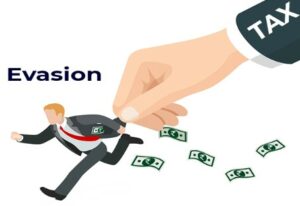Tax evasion involving credit cards carries serious consequences, impacting individuals, businesses, and the economy at large. In this comprehensive guide, we’ll delve into the world of card tax evasion penalties, examining their significance, enforcement, and implications. From legal ramifications to financial penalties, we’ll explore how tax evasion involving credit cards is detected, prosecuted, and punished, shedding light on the importance of compliance and transparency in financial matters.

Understanding Card Tax Evasion
Card tax evasion refers to the illegal act of concealing income, assets, or transactions related to credit card activities to evade taxes owed to the government. This can include underreporting income, inflating deductions, or using offshore accounts to hide assets and income from tax authorities.
Importance of Tax Compliance
Tax compliance is essential for maintaining the integrity of the tax system and ensuring that all individuals and businesses contribute their fair share to government revenues. Card tax evasion undermines the tax system, depriving governments of much-needed funds for essential services and programs.
Detection and Investigation
Detecting and investigating card tax evasion requires collaboration between tax authorities, financial institutions, and law enforcement agencies. Advanced data analytics, forensic accounting techniques, and whistleblowers play a crucial role in uncovering fraudulent activities and prosecuting offenders.
Penalties for Card Tax Evasion
Card tax evasion carries severe penalties, including fines, penalties, and criminal prosecution, depending on the severity of the offense and the amount of tax evaded.
Civil Penalties
Civil penalties for card tax evasion may include fines, interest, and penalties imposed by tax authorities for underreporting income, filing false tax returns, or failing to disclose offshore accounts. The amount of civil penalties varies depending on the amount of tax evaded and the taxpayer’s compliance history.
Criminal Penalties
Criminal penalties for card tax evasion can result in prosecution, imprisonment, and substantial fines. Tax evasion is considered a serious criminal offense, punishable by imprisonment of up to five years and fines of up to $250,000 for individuals and $500,000 for corporations.
Enforcement and Prosecution
Enforcing tax laws and prosecuting card tax evasion requires coordination between tax authorities, law enforcement agencies, and prosecutors to gather evidence, build cases, and hold offenders accountable.
IRS Investigations
The Internal Revenue Service (IRS) conducts investigations into suspected cases of card tax evasion, using various tools and techniques to uncover evidence of fraudulent activities. IRS agents may conduct interviews, review financial records, and collaborate with other agencies to build cases against tax evaders.
Legal Proceedings
Legal proceedings for card tax evasion typically involve civil and criminal actions brought against offenders by tax authorities and prosecutors. Taxpayers accused of tax evasion have the right to legal representation and due process, including the opportunity to contest charges and present evidence in their defense.
Impact on Individuals and Businesses
Card tax evasion can have devastating consequences for individuals and businesses, including financial losses, reputational damage, and legal liabilities.
Financial Losses
Tax evaders face significant financial losses, including fines, penalties, and back taxes owed to the government. In addition, legal fees and court costs associated with defending against tax evasion charges can further exacerbate financial hardship.
Reputational Damage
Card tax evasion can tarnish the reputation of individuals and businesses, leading to loss of trust among customers, partners, and stakeholders. Reputational damage can have long-lasting effects on an individual’s career or a company’s ability to attract clients and investors.
Conclusion: Upholding Tax Compliance
Card tax evasion carries severe penalties and consequences for individuals and businesses. Effectively underscoring the importance of tax compliance and transparency in financial matters. By adhering to tax laws, reporting income accurately, and maintaining proper records, taxpayers can avoid the pitfalls of tax evasion and protect themselves from legal and financial harm.
Tax authorities play a vital role in enforcing tax laws and holding offenders accountable for their actions. Through collaboration, enforcement efforts, and public awareness campaigns. Governments can deter tax evasion and ensure that all taxpayers contribute their fair share to the public coffers.
In conclusion, card tax evasion penalties serve as a deterrent against fraudulent activities. They promote fairness, integrity, and accountability in the tax system. Upholding tax compliance and transparency. Through this, individuals and businesses can contribute to the well-being of society. They can uphold the principles of fiscal responsibility and economic justice.

